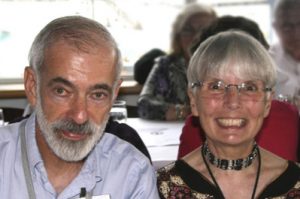
About George Robinson & Janice Moulton:
Robinson and Moulton grew up in New York City, met at Cornell and went to graduate school at the University of Chicago. Moulton’s PhD is in philosophy; Robinson’s in psychology. They became college professors who used to write academic books about language, ethics, and China and articles about several other topics including robots, visual illusions and debunking pseudoscience. They switched to writing thrillers after having their own adventures: They fled East Berlin with US Army intelligence officers just before the big demonstration that brought down the Berlin Wall. They were interrogated by Chinese Security Police about the student demonstrations before the Tiananmen disaster. They gathered enough spent bullets from the street in front of their Chicago apartment to counterweight harpsichord keys; saved 60 people from a bus-crash in rural Thailand; danced with Uighurs on a Chang Jiang riverboat; rode horses in New Zealand with a stuntman who doubled a Lord of the Rings Nazgûl; and some other things you can’t know about. They continue to write fiction and are finishing a novel based on the discovery of diamonds in China. The rest of their time is spent working with students, traveling, collecting Ghanaian paintings, doing music and photography.
What inspires you to write?
For our non-fiction books, we were inspired as teachers to share our insights on problems and phenomena we thought were interesting and important. For fiction there are two inspirations, One is that we have gotten so much pleasure from reading fiction over the years that we feel an obligation to contribute. The second is that creating a fictional world and making it coherent and engaging is challenging and satisfying. That’s more a motivation than an inspiration, but the two are intertwined.
Tell us about your writing process.
Since there are two of us and we’ve been writing together since graduate school our process may be a little different. We don’t specialize; we collaborate on everything from the germ of the idea to the final wording. Our outlines and drafts go back and forth between us hundreds of times. Frederik Pohl and Cyril Kornbluth, when asked of a jointly-authored work “who did what?” are reported to have said that one of them wrote the nouns and the other the verbs. When we are asked the same question, we say that one of us wrote the vowels and the other the consonants. This represents the spirit of our collaboration. The order in which our names appear on the cover is the reverse of our previous book. Going back to the beginning, the author listing of our first book was determined by an elaborate Alphonse and Gaston routine.
For Fiction Writers: Do you listen (or talk to) to your characters?
While we may not have conversations with our characters, we sometimes just sit back and observe them, try to learn from their behavior and try to understand what they are feeling. They are people after all.
What advice would you give other writers?
Be very careful with point-of-view. If the reader is following a character around your novel, they should share the limited knowledge and perspective of that character. And develop backstories for them; that helps keep POV consistent. Also, if you are writing fiction about the real world (this is less necessary for genres like fantasy) make sure your contextual details are correct. Readers know a lot of things about the world. If you get details wrong this makes your context shaky and the reader has a hard time with the “willing suspension of disbelief” needed to appreciate a story.
How did you decide how to publish your books?
Our scholarly books were all published with scholarly publishers, like Cambridge University Press. We tried to find the ones who dealt with the areas we wrote in and then chose the best publisher from among the offers we got. When we started writing fiction we had no idea how to get novels published. After a bit of floundering we submitted to Amazon Kindle. But we have to learn how to do our own publicity. For our second novel, we may try to find a literary agent. From what we heard this requires connections. Ah, connections.
What do you think about the future of book publishing?
Books on paper will probably become less common as people get used to reading digital forms. Since modern digital readers are often clearer and easier to read than printed books, we expect this segment to expand. For those who demand traditional paper formats, print-on-demand will expand while tradition “publishing runs” will diminish. Hopefully this will make publishing more democratic and allow more access for “unconnected” and new authors who have a harder time attracting the attention of literary agents and publishers. Well-read audio format should also remain viable; digital deliver is easy for those.
What do you use?: Beta Readers
What genres do you write?: Non-fiction, adventure fiction.
What formats are your books in?: eBook
Website(s)
Link To George Robinson & Janice Moulton Page On Amazon
Your Social Media Links
Facebook
All information in this post is presented “as is” supplied by the author. We don’t edit to allow you the reader to hear the author in their own voice.
